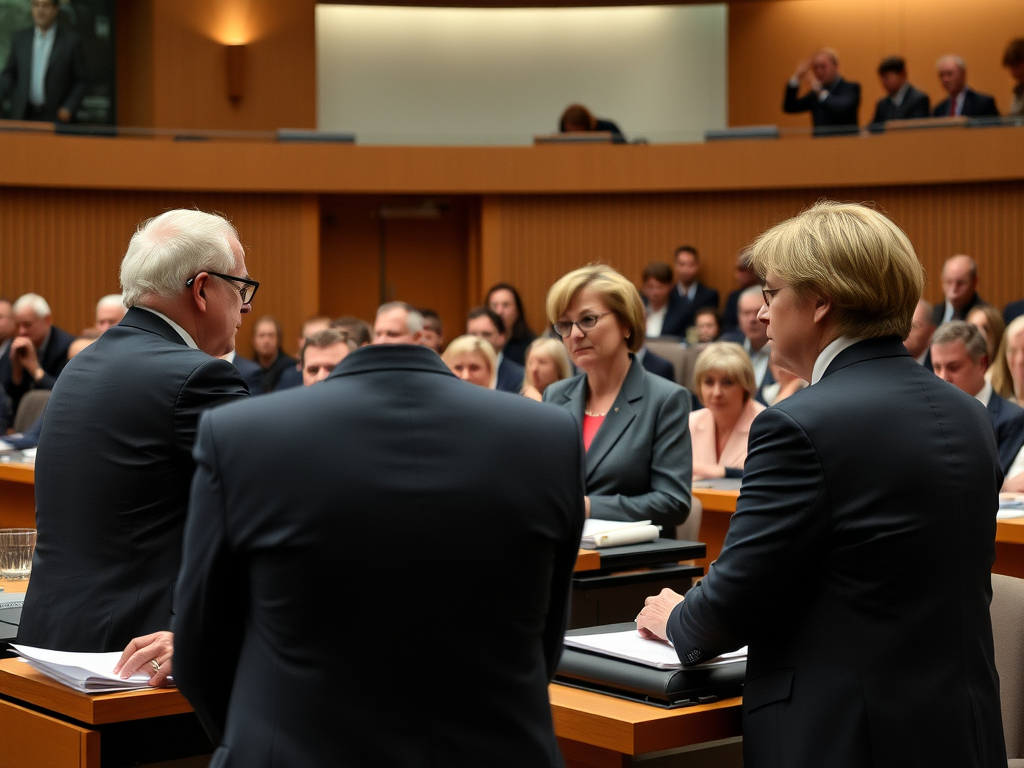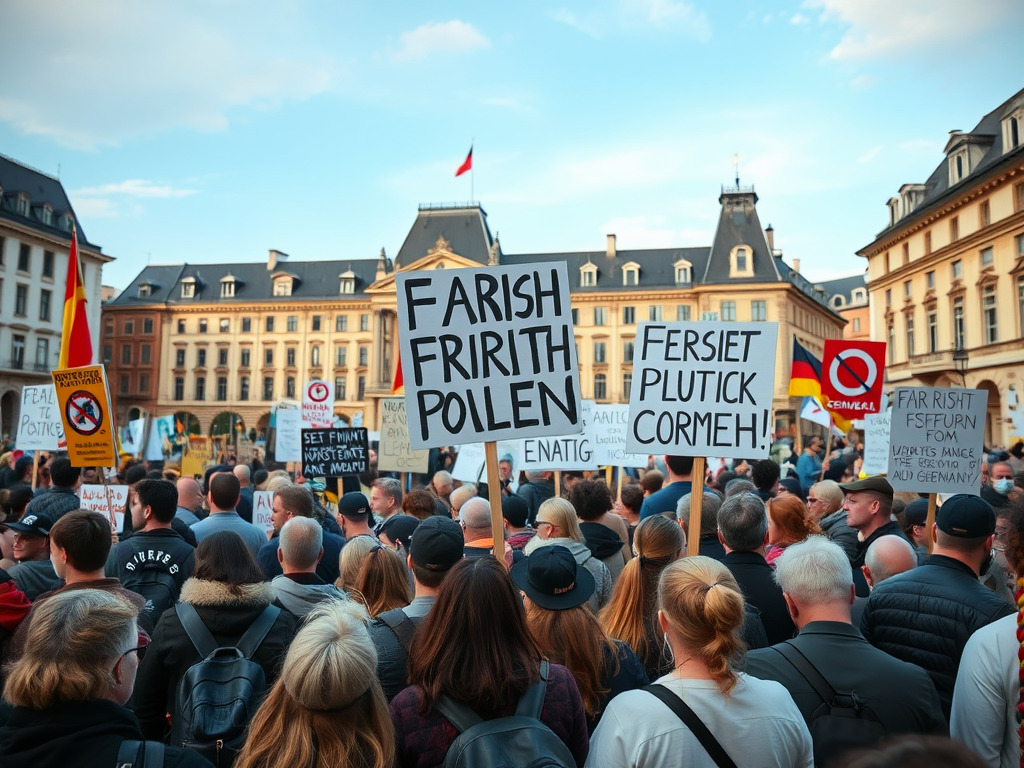INTRODUCTION
- Friedrich Merz and his Christian Democratic Union (CDU) sparked fresh political controversy in Germany.
- The controversy stems from recent partnerships at the local level with the far-right Alternative für Deutschland (AfD) party, an alliance many describe as a breach of Germany’s post-WWII democratic consensus.
- Prominent politicians and civil society groups voiced strong outcry. The controversy originated in a Thuringia vote where CDU members effectively collaborated with the AfD to pass a motion.
- Germany’s Chancellor Olaf Scholz condemned this move, as did many other leading voices in the European Union, who warned that engaging with the AfD could be harmful.
- The AfD, widely seen as a far-right extremist party, risks undermining Germany’s democratic principles through its involvement.
- Critics fear this move signals a broader shift to the right in German politics, potentially causing ripple effects across Europe.
- Anti-immigration sentiment and economic uncertainty fuel the AfD’s continued rise in public polls.

Latest Developments
- The CDU decided to cooperate with the AfD in Thuringia, stirring political turbulence in Germany.
- This situation spilled beyond national boundaries.
- Not all CDU members supported this measure, resulting in a split vote.
- Some individuals collaborated with the AfD and FDP to advance a tax-focused proposal.
- The CDU leadership does not yet entirely agree with the alliance, and a gap remains from the Thuringia decision.
- Friedrich Merz, a person under scrutiny, failed to implement stricter regulations that might have prevented such collaborations.
- These amalgamations occurred at lower administrative levels.
- Chancellor Olaf Scholz discussed the incident, finding it extremely distressing, and declared,
- “In our democratic society we cannot permit links with extremists.”
- The CDU then communicated that the national board did not back the Thuringia decision.
- Friedrich Merz released a statement declaring, “CDU does not partner with AfD.
- ” The situation remained tense as disciplinary action loomed over him.
- Critics disagreed, insisting Merz’s statement was insufficient and did not meet the strict rules needed to prevent similar occurrences in the future.
Background and Context
- CDU’s potential alignment with AfD makes the situation contentious.
- This issue relates to Germany’s strong dedication to democratic values, first instilled after World War II.
- Germany has steadfastly adhered to these values since then.
- The toppling of Nazi rule made it a watershed moment.
- German politics subsequently brewed under unique conditions, namely the implementation of an unwritten “cordon sanitaire” that barred mainstream parties from affiliations with extremist wings.
- In 2013, the AfD surfaced as a Eurosceptic party, but it veered further to the right and became infamous for its immigration stance.
- The party vehemently opposed Chancellor Angela Merkel and her open-door refugee policy.
- Then, the party faced serious charges of providing shelter to neo-Nazi sympathizers, prompting the Office of Protection of Constitution, Germany’s domestic intelligence service, to initiate surveillance.
- The CDU, one of Germany’s major center-right parties, struggles to maintain its identity in the rapidly changing political landscape, experiencing declining support, particularly in eastern Germany, where the AfD is gaining popularity.
- Some analysts attribute the CDU’s problems to local politicians tempted by short-term gains through cooperation with the far-right.
- Globally, the normalization of far-right ideologies, particularly evident in Europe, poses a significant problem.
- France and Italy have already seen gains from far-right parties.
- Germany, once a bulwark against such movements, now faces similar shifts, potentially emboldening other far-right parties across Europe and endangering the European Union by jeopardizing its fundamental democratic values.
Future Outlook
- The CDU stands at a critical juncture, pushing ahead.
- If Friedrich Merz doesn’t take strong action, ties with the AfD could result, fracturing the party’s support base and alienating moderate conservatives.
- A long-term political crisis could thus materialize in the CDU, especially considering the party’s already shaky standing in eastern Germany due to the AfD’s increasing dominance.
- Political experts warn of a dire scenario: the CDU could split its voter base, and a crisis could take root within the party.
- The AfD’s ever-growing dominance in the east has already weakened the CDU.
- Immediate action is necessary, and only Mr. Merz can make a difference.
- We must prevent further collaboration with the AfD; the task is not simple, and the consequences could be dire, alienating moderate conservatives and leading to a long-term political crisis that could devastate the CDU, particularly given the impact on eastern Germany.
- The AfD’s dominance has weakened key aspects of the party.
- Klaus Müller, a political analyst at the Berlin Institute for Political Studies
- It predicts that if the CDU doesn’t draw a hard line now.
- it may permanently lose its position as a centrist force in German politics, creating a vacuum that the AfD would readily fill, endangering not only Germany’s democratic framework but also the entire European Union.
- Germany’s political integrity is under intense global scrutiny.
- Neighbors and friends watch warily, concerned about a shift toward the AfD’s far-right ideology, which could complicate international relations, especially with the United States and EU member states already battling their own populist movements.
- This controversy will likely shape discussions about democracy and the rise of far-right ideologies for years to come.

Comprehensive FAQ Section
1. What is the controversy surrounding the CDU in Thuringia?
The CDU’s regional members in Thuringia recently voted alongside the far-right AfD and FDP to pass a local tax policy. This cooperation with the AfD—recognized as an extremist party—has sparked criticism from within Germany and across Europe. While the move was not sanctioned by the CDU’s national leadership, critics see it as a dangerous precedent for mainstream parties’ willingness to align with far-right factions.
2. Why is the AfD controversial?
The AfD is controversial due to its far-right ideologies, which include anti-immigration policies, nationalist rhetoric, and accusations of ties to neo-Nazi groups. Germany’s intelligence agency monitors sections of the AfD for extremist tendencies, and civil rights organizations frequently condemn the party for fostering xenophobia and hate speech.
3. How has Friedrich Merz responded to the incident?
CDU leader Friedrich Merz has denied any official collaboration with the AfD, emphasizing that the Thuringia vote was not authorized by the party’s national board. However, critics argue that Merz’s response lacks the strong disciplinary action required to prevent future incidents. He has faced calls to implement stricter measures at the local level.
4. What are the implications for German politics?
The CDU-AfD collaboration in Thuringia raises significant concerns about the erosion of Germany’s political boundaries against extremism. It risks normalizing far-right ideologies within mainstream politics, potentially reshaping the country’s political landscape as the AfD gains momentum in public opinion polls.
5. Could this incident affect Germany’s international standing?
Yes. Germany has long been seen as a defender of liberal democracy in Europe. Any perceived shift toward far-right politics could weaken its influence within the European Union and harm its relationships with international allies, especially those prioritizing democratic norms.
CONCLUSION
CDU’s contentious Thuringia choice marks a crucial juncture in German politics. It highlights the limits of the nation’s post-WWII democratic harmony. Criticism is mounting. The party faces a vital choice: it must decide to uphold its middle-ground principles or risk deeper entanglement with the far-right. This event will likely reshape both internal and European political landscapes. This makes it crucial for citizens and decision-makers to remain vigilant. Continue tracking our updates; we provide the latest information on Germany’s evolving political environment. Our coverage continues to evolve.




